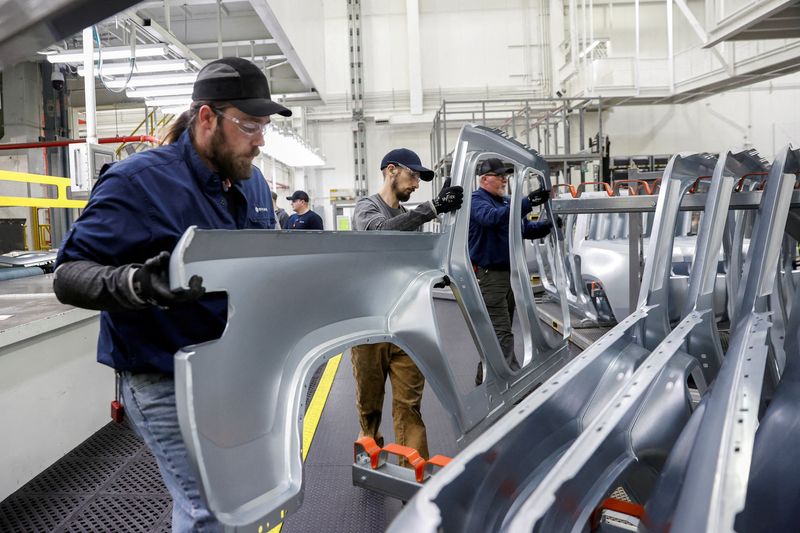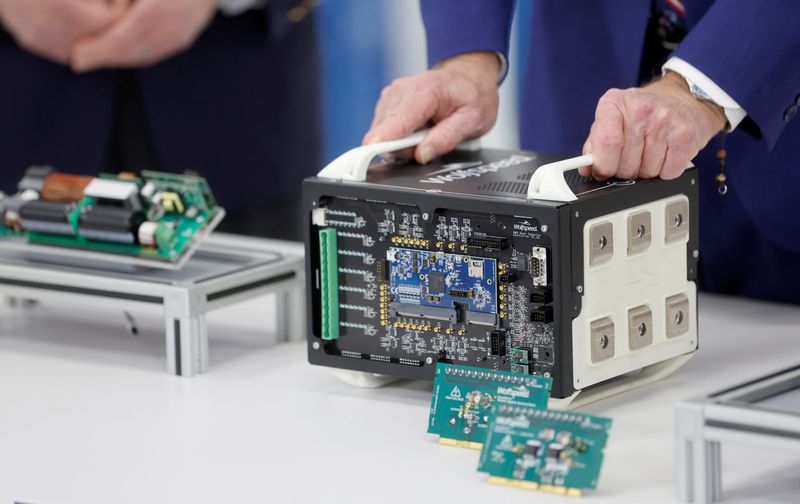By Lisa Baertlein
LOS ANGELES (Reuters) - Manufacturers of everything from pickup trucks to homes are still grappling with tight supplies of microchips and cement - shortages that could translate into delays and higher costs for federal efforts to arm Ukraine against Russian aggression and rebuild U.S. crumbling infrastructure and manufacturing.
The supply chain woes that sent costs soaring and spurred shortages of everything from toilet paper to passenger cars are easing for retail-focused industries, but remain stubbornly persistent in important growth sectors like autos, machinery, defense and non-residential construction, experts said.
"For sectors where demand is still strong, we are still seeing issues of materials shortages, and these problems will take additional time to resolve," said Jason Miller, associate professor of logistics at Michigan State University's business school.
"One of the big issues as we're trying to ramp up the military industrial base is having enough electronic components," Miller said.
Companies that make war weapons like shoulder-fired Javelin and Stinger missiles are awaiting U.S. funding before starting new production for Ukraine. When the defense industry gets that greenlight, their scramble to source semiconductors and other hard-to-find electronic components could usher in a new wave of supply chain snarls that disrupt production and drive up costs.
"Any general shortage in semiconductors will affect defense," said Brad Martin, director of Rand Corp's National Security Supply Chain Institute.
The problem has eased in some areas. Supplies of semiconductors for personal computers improved after kids went back to the classroom and parents returned to their offices - crushing sales of new machines.
On the other hand, ongoing demand for auto and farm equipment has kept stocks of microchips that act as electronic brains in that machinery tight.
Farm and construction equipment maker Caterpillar Inc (NYSE:CAT) is still competing with car makers to get its hands on limited supplies, Caterpillar CEO Jim Umpleby said at a March 14 conference in Las Vegas.
"It's gotten a bit better, but it's still not what it was pre-pandemic," said Umpleby.
General Motors (NYSE:GM) last week reopened its Silao, Mexico, plant that turns out Chevrolet Silverados and GMC Sierras after halting production for more than a week due to hiccups in semiconductor availability that the company is working to resolve.
"As we've moved through the past year or so, we have seen gradual improvement in our supply chain, including semiconductors ... Short-term disruptions will continue to happen," GM spokesman Dan Flores told Reuters in an email.
A global shortage of cement - a key input for concrete used to build bridges, highways and factories - threatens to slow down federally-funded infrastructure and American-made semiconductor and green energy factory projects.

Cement producer Martin Marietta Materials (NYSE:MLM) reported "robust demand" in its largest market of Texas, where it is already seeing "sold-out conditions," CEO Ward Nye said on a Feb. 15 earnings call.
Michigan State University's Miller said ready-mix concrete and concrete products such as blocks and highway dividers are highly sought after. "It's probably one of the strongest sectors in manufacturing at the moment. It hasn't shown signs of cooling down."
